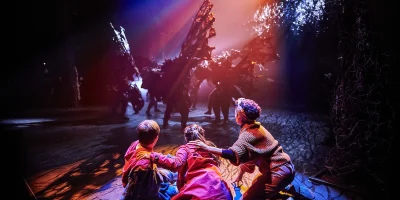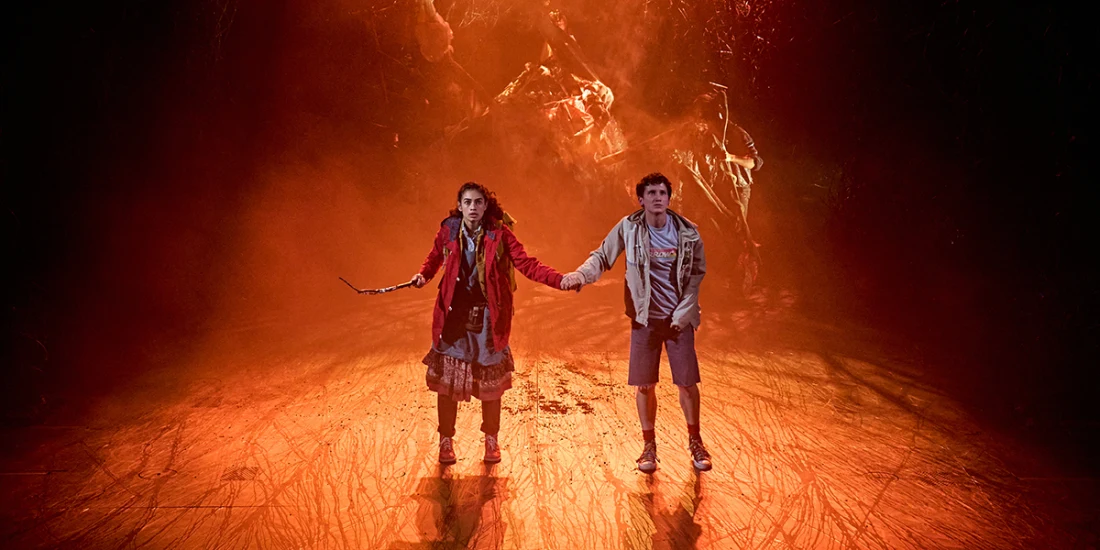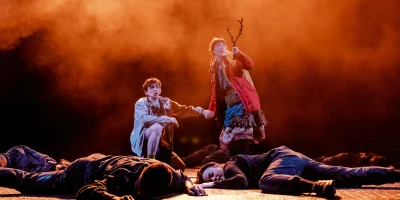
'The Ocean at the End of the Lane' review - a coming-of-age tale that exemplifies magical realism
The monsters are back. Neil Gaiman's fantasy novel came to life at the National Theatre in 2019 and now, following a Covid delay, is weaving its magic over the West End. And this piece is magical in every sense: in the way that Gaiman delves into other worlds and locates the enchantments in our own, as well as the transformational power of theatre, on full display in Katy Rudd's spectacular production.
Joel Horwood has deftly adapted the story for stage. It centres on the unnamed Boy, now an adult, who returns to his rural hometown for his father's funeral. While there, he meets a neighbour, Old Mrs Hempstock, who reminds him of an extraordinary experience in his past. When he was 12, he accompanied her granddaughter, Lettie, to bind a monster, but it invaded their world - with terrible consequences.
Gaiman wrote The Ocean at the End of the Lane for his wife and, because she prefers feelings over fantasy, as he puts it, he included more autobiographical and emotional elements. The enthralling result is a tale where the mystical and the familiar merge, the child and the adult, the imaginative and the deeply heartfelt. It's magical realism at its best.
The monstrous invasion is a very personal one to Boy. Following the death of his mother, he lives with his distant father and taunting sister, and he delves into books to escape the pain of reality. But suddenly home isn't safe; even the inside of his head is a war zone. Gaiman stealthily introduces heavy material into what initially seems like a whimsical fairy story: grief, trauma, abuse.
There's also an earthiness to his telling. Boy's sense of comfort is at least 50% food: at home, his hapless father always burns the toast, but at the Hempstock farm, there's milk fresh from the cow, porridge with a dollop of jam and sweet honeycomb. And there's unbounded joy in the burgeoning friendship between two misfits, Boy and Lettie, liberated by meeting someone else who accepts them for exactly who they are.
But that's offset by the genuinely scary elements. The invader nightmarishly reshapes Boy's world, like trapping him via a series of locked doors (Gaiman's tale is in conversation with literary classics like Alice's Adventures in Wonderland and the Narnia books). It also brings out the darkness in his own father - the greatest betrayal of all for a child.
Rudd's inventive production keeps unpeeling new layers. Fly Davis's design of a quiet lane surrounded by wiry thickets constantly evolves, placing domestic furniture within this uncanny setting or revealing the unsettling supernatural creatures that lie just beyond our reach. The excellent ensemble, who assist with all the slick scene changes, are clad in black, allowing them to creep out of the dark.
Paule Constable's moody, Olivier Award-winning lighting is also key to this straddling of different realms, as are Jamie Harrison's illusions, Samuel Wyer's puppetry, Ian Dickinson's sound and Steven Hoggett's movement. It's magic conjured before us, hands grasping silk and holding aloft spines and snapping jaws. As a whole, it makes you gasp in wonder at theatre's scope, while expertly tapping into your primal fears.
The performances are excellent, too. Nia Towle, Siubhan Harrison and Penny Layden are a beguiling trio of practical witches, who worry about their cows as much as battling otherworldly creatures. Towle in particular hovers between youthful eagerness and an unfathomably old soul, and Layden has all the wonderful wry quips. Theirs is a matriarchal utopia of sorts; what, sniffs Harrison's prickly Ginnie, would she need a man for when she can do everything better herself?
James Bamford is slightly too mannered as Boy, though ably conveys his sense of anxiety and abandonment, but Grace Hogg-Robinson is pitch-perfect as his brash sister and Laura Rogers is a hair-raising manipulator. As their dad, Nicolas Tennant hints at generational layers of violence when he refers grimly to what his own father would have done when he misbehaved. Giving his bookworm son boxing gloves shows just what a gulf there is between them.
It's a coming-of-age tale that will appeal to all ages, fascinatingly muddying our sense of time, blurring the boundaries between memory and imagination - if it feels true, it is true - and showing how stories can make sense of our reality. Above all, it's a glorious example of how theatre can tell those stories in a way that no other art form can.
Photo credit: Nia Towle and James Bamford (Photo by Manuel Harlan)
Originally published on

